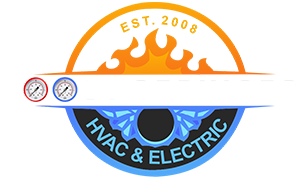Before diving into solutions, it’s crucial to understand why your AC might be blowing hot air. This knowledge will not only help you fix the current issue but also prevent future problems. Learning how to fix AC blowing hot air begins with understanding the system. Air conditioning systems are complex, and understanding their basic functioning can demystify the process for you. By knowing how the refrigerant cycle works and the role of each component, you can better diagnose issues. Additionally, recognizing symptoms early can prevent more costly repairs down the line.
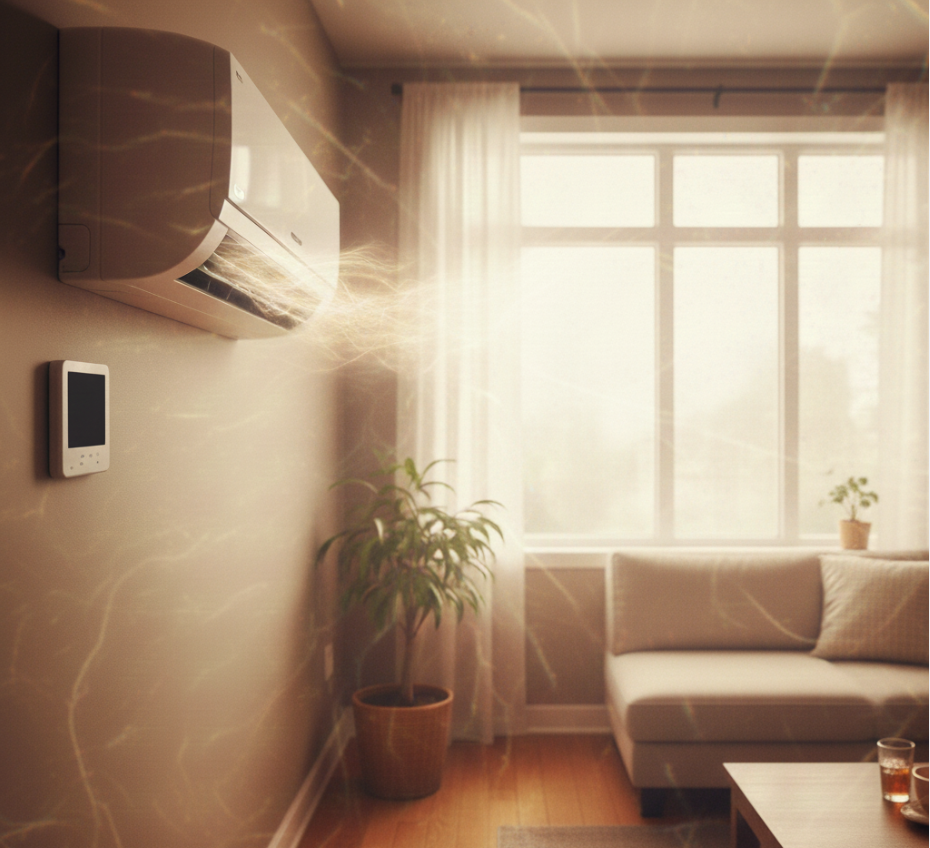
Table of Contents
Common Causes of Car and Home Air Conditioners Blowing Warm Air
Common Causes for Car Air Conditioners
- Refrigerant Leak: One of the most common causes for a car AC blowing warm air is a refrigerant leak. Without enough refrigerant, the system cannot cool the air effectively. Leaks can occur at various points in the system, including the hoses, connections, and seals, often requiring a thorough inspection to pinpoint the exact source. Regular checks can help catch leaks early, preserving the system’s integrity and performance.
- Faulty Compressor: The compressor is essential for circulating the refrigerant. If it’s malfunctioning, the AC won’t cool the air. Common signs of compressor failure include strange noises or a lack of cold air. A malfunctioning compressor often requires professional assessment and repair or replacement, as it’s a critical component that affects the entire system.
- Electrical Issues: Problems with the electrical system can prevent the AC from functioning correctly. This could be anything from a blown fuse to a faulty relay. Electrical issues can be complex, involving anything from minor circuit problems to more significant wiring failures. Regular inspections of the electrical system can help identify potential issues before they escalate.
- Clogged Filters: Dirty or clogged filters can restrict airflow and reduce the cooling capacity of your AC. Filters should be checked regularly as part of routine maintenance, ensuring they are clean and allowing for optimal airflow. Neglecting filter maintenance can lead to more severe system failures due to increased strain on the system.
Common Causes for Home Air Conditioners
- Dirty Air Filters: Similar to car AC, dirty air filters in a home unit can lead to poor airflow and reduced cooling. Regular replacement or cleaning is essential to maintain efficiency and air quality. Over time, dirt and dust buildup can significantly impact the performance of your AC unit, leading to higher energy bills and reduced cooling capacity.
- Thermostat Issues: If the thermostat is not working correctly, it might not signal the AC to start cooling. Faulty thermostats can lead to inconsistent temperatures and increased wear on your unit. Modern programmable thermostats offer enhanced control and efficiency, making them a worthwhile investment if your current thermostat is outdated or malfunctioning.
- Refrigerant Problems: Low refrigerant levels due to leaks will prevent your home AC from blowing cold air. Like car AC systems, home units require a specific refrigerant charge to operate efficiently. Regular checks and professional servicing can help maintain the correct levels and prevent leaks from going unnoticed.
- Frozen Evaporator Coils: Ice buildup on the coils can block airflow and cause the AC to blow warm air. This issue often results from poor airflow or low refrigerant levels and requires immediate attention to prevent further damage. Routine maintenance and inspections can help detect early signs of coil freezing, allowing for timely intervention.
How to Fix Your Car’s AC Blowing Hot Air
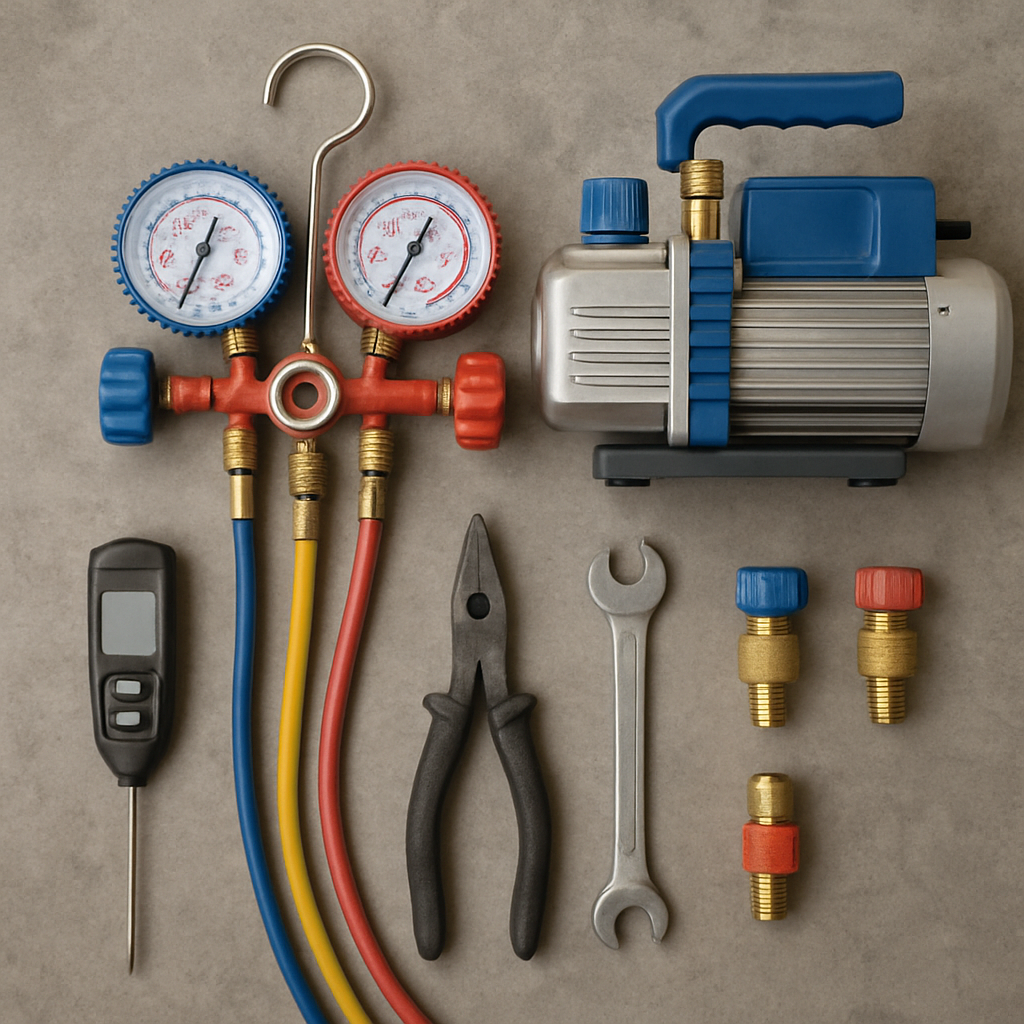
Step 1: Check the Refrigerant Level
- Locate the AC System: Under the hood, find the low-pressure service port. Familiarize yourself with the layout of your car’s AC system, as this will make maintenance tasks easier.
- Use a Recharge Kit: Attach the kit to the port and check the pressure. If it’s low, you may need to recharge the system with refrigerant. Ensure you follow all safety guidelines when handling refrigerant, as improper handling can lead to accidents.
Step 2: Inspect the Compressor
- Listen for Noises: Start your car and turn on the AC. Listen for any unusual noises coming from the compressor. Noises can be indicative of mechanical issues, so pay attention to sounds like grinding or rattling.
- Visual Check: Look for signs of damage or leaks around the compressor. Visible damage or oil spots can signify internal issues, requiring professional diagnosis and repair.
Step 3: Evaluate Electrical Components
- Check Fuses: Locate the fuse box and check if the AC fuse is blown. Replace it if necessary. A blown fuse is a simple fix but can indicate underlying electrical issues if it occurs frequently.
- Inspect Wiring: Look for any visible signs of damage or corrosion in the wiring. Regular inspections can help maintain the integrity of the electrical system, preventing more severe issues.
Step 4: Replace or Clean Air Filters
- Locate Filters: Depending on your vehicle, the cabin air filter might be behind the glove box or under the hood. Knowing the location of your filters ensures timely maintenance.
- Replace or Clean: If it’s dirty, replace or clean it to ensure proper airflow. A clean filter not only improves AC performance but also enhances air quality inside the vehicle.
How to Fix Your Home AC Blowing Hot Air
Step 1: Replace or Clean Air Filters
- Turn Off the AC: For safety, always turn off the AC unit before performing maintenance. This prevents accidents and protects the system from damage.
- Remove the Filter: Locate and remove the filter, usually found near the return air duct. Familiarize yourself with your system’s layout to make maintenance tasks easier.
- Clean or Replace: If it’s washable, clean it thoroughly. Otherwise, replace it with a new one. Regular maintenance of filters extends the lifespan of your AC unit and maintains indoor air quality.
Step 2: Check the Thermostat Settings
- Correct Settings: Ensure the thermostat is set to “cool” and the temperature is lower than the current room temperature. Simple setting errors are common and can easily be corrected.
- Replace Batteries: If it’s a battery-operated thermostat, replace the batteries to rule out power issues. Regular battery checks can prevent unexpected failures and ensure consistent operation.
Step 3: Inspect Refrigerant Levels
- Professional Help: For safety, it’s best to contact a professional to check and refill refrigerant levels if necessary. Handling refrigerant requires specialized tools and knowledge, making professional assistance essential.
- Regular Inspections: Schedule regular inspections to maintain optimal refrigerant levels and prevent leaks. This proactive approach helps avoid more severe issues and ensures efficient operation.
Step 4: Examine Evaporator Coils
- Check for Ice: If you notice ice on the coils, turn off the AC and let it thaw. Prompt action prevents further damage and restores normal function.
- Professional Cleaning: If the problem persists, have a professional clean and inspect the coils. Regular coil maintenance improves efficiency and prolongs the life of your AC unit.
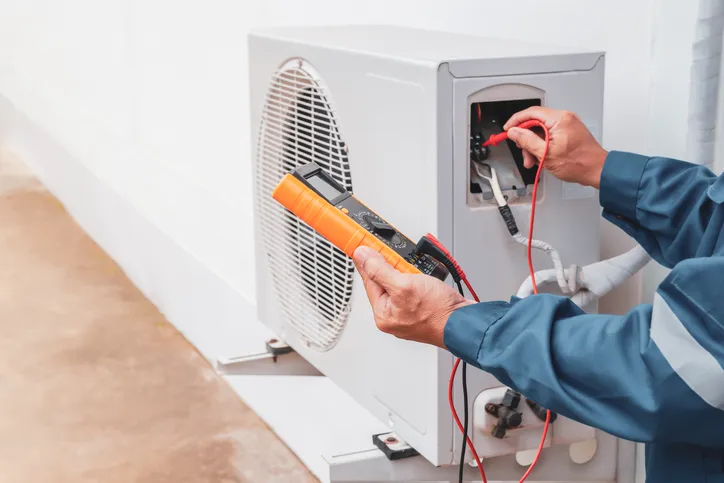
When to Call a Professional
While some issues can be resolved with a bit of DIY, others may require professional intervention. If you’ve followed the steps above and your AC is still blowing hot air, it’s time to call an expert. Here’s when you should consider getting professional help:
- Persistent Refrigerant Leaks: Handling refrigerant requires specific tools and expertise. Professionals can accurately diagnose and fix leaks, preventing further damage and ensuring safety.
- Major Electrical Issues: Complex wiring problems or issues with the main electrical system need a professional touch. Attempting to fix these issues without proper knowledge can lead to further damage or safety hazards.
- Significant Mechanical Failures: If parts like the compressor or evaporator coils are severely damaged, a professional repair or replacement is necessary. Expert assessment ensures the correct solution and restores system efficiency.
Tips for Maintaining Your AC System
To prevent future problems and ensure your AC system runs efficiently, consider the following maintenance tips:
- Regular Service Checks: Schedule routine maintenance checks with a professional to catch issues early. Professional checks often include detailed inspections that can identify hidden problems.
- Clean Filters Regularly: Keep air filters clean and replace them as recommended by the manufacturer. Clean filters improve airflow, enhance efficiency, and maintain air quality.
- Monitor Refrigerant Levels: Keep an eye on refrigerant levels and address any leaks promptly. Regular monitoring prevents system strain and ensures optimal performance.
- Check Thermostat Functionality: Ensure your thermostat is working correctly and replace it if needed. A functioning thermostat ensures accurate temperature control and efficient operation.
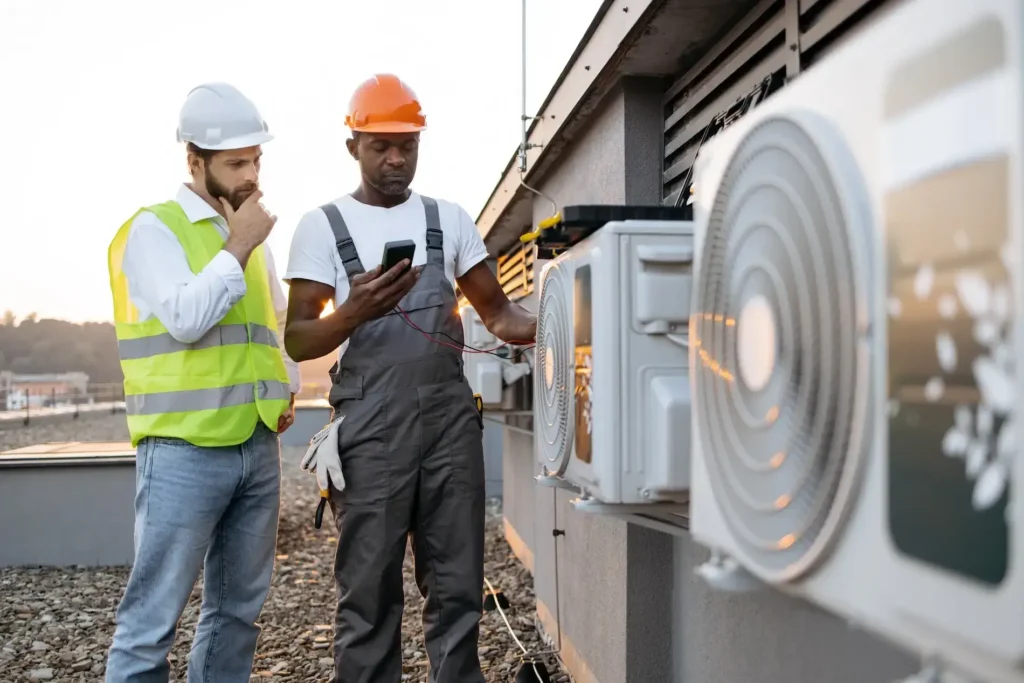
Conclusion
In Pasadena’s heat, a functioning AC is not just a luxury but a necessity. By understanding common issues and implementing the solutions outlined in this guide, you can ensure your AC system is reliable and efficient. Remember, while DIY fixes can solve many problems, don’t hesitate to call a professional when needed to guarantee the highest quality service and peace of mind. Regular maintenance and timely repairs not only extend the lifespan of your system but also contribute to better energy efficiency, saving you money in the long run.
Quick Answers — How to Fix AC Blowing Hot Air
Why is my AC blowing hot air instead of cooling?
Common causes include incorrect thermostat settings, a clogged air filter, tripped breaker to the outdoor unit, dirty or frozen coils, low refrigerant from a leak, or a failed outdoor component like a capacitor, contactor, or fan motor.
What should I check first before calling a technician?
Run these quick checks:
- Thermostat set to Cool and fan on Auto
- Target temperature at least 3–5°F below room temperature
- Clean, correctly installed air filter
- Outdoor breaker/disconnect for the condenser is ON
- Supply and return vents open and unobstructed
Can the thermostat cause warm air from my AC?
Yes. Wrong mode (Heat), fan set to On, dead batteries, or incorrect schedules can push warm or room-temperature air. Set to Cool, Fan Auto, update batteries, and verify schedules.
How does a dirty air filter lead to hot air?
A clogged filter restricts airflow, reducing heat transfer and sometimes icing the evaporator coil. Replace filters every 30–60 days during heavy use or sooner if they look dirty.
What simple steps can fix AC blowing warm air?
Try these in order:
- Set thermostat to Cool and Fan Auto, then lower the setpoint
- Replace the air filter
- Cycle power: turn system Off for 5 minutes, then back On
- Clear debris and vegetation 24 inches around the outdoor unit
- Confirm the outdoor breaker/disconnect is not tripped
Why does my AC blow warm after a power outage?
Outages can trip breakers or lock out controls. Turn the system Off for 5 minutes, reset any tripped breaker, then restart in Cool. If the outdoor unit stays silent, call a pro.
Could low refrigerant be the reason for hot air?
Yes. Low charge from a leak reduces cooling capacity and may cause icing. Only licensed technicians should locate leaks, repair them, and recharge to the correct level.
Do dirty coils make the AC blow hot?
Yes. Dirt on evaporator or condenser coils blocks heat transfer, so air feels lukewarm or hot. Keep the outdoor coil clean and schedule professional coil cleaning when needed.
What outdoor unit issues should I look for?
Check if the condenser fan and compressor are running. Hot air can result from a tripped breaker, failed capacitor/contactor, blocked coil, seized fan motor, or damaged wiring.
Is it safe to keep running the AC if it’s blowing hot air?
No. Running under fault conditions can damage the compressor or cause icing and water leaks. Turn the system Off and investigate or call a technician.
When should I call a professional immediately?
Call right away if you see ice on lines or the indoor unit, smell burning or chemicals, hear loud banging/screeching, or if breakers keep tripping.
How can I prevent hot air problems in the future?
Change filters regularly, keep 24 inches of clearance around the outdoor unit, schedule annual tune-ups, flush the condensate drain, seal accessible ducts, and avoid extreme thermostat setbacks during heat waves.
